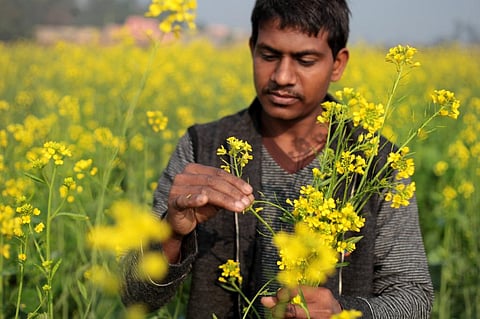

Mustard farmers are in a fix as the market prices of the rapeseed mustard crop were hovering close to the minimum support price (MSP) or even below in some areas the last few weeks.
The government has declared an MSP of Rs 5,450 per quintal for rapeseed mustard for the current Rabi marketing season 2023-24.
At the mandi (market) closest to 9 Knn village in Rajasthan’s Hanumangarh district, the prices are currently ruling between Rs 4,800-5,200 per quintal, said Jitender Kumar, a mustard farmer from the village.
“Last year, the rates were between Rs 6,300-6,500 per quintal,” he added. Kunar has sown the crop on 1.5 hectare (ha). He feared that in the next 15 days when he will start harvesting the crop, the prices would fall further.
Om Prakash, another mustard farmer from Charanwasi village in Hanumangarh, said that compared to last year’s prices of Rs 7,000 per quintal at the nearest Nohar mandi, the rates of the oilseed crop have fallen to Rs 5,200-Rs 5,400 per quintal.
He added:
For the last three years, the prices have been ruling above MSP and farmers were getting good rates. Because of this, the area under mustard also improved and farmers diverted their area from wheat to mustard. But this time the prices have crashed.
Meanwhile, farmers whose crops suffered frost damage in January were facing a double whammy with the price crash.
As of February 3, 2023, the area under mustard in 2022-23 crop season was recorded to be 9.8 million hectares, an increase of 777,000 ha compared to 2021-22 crop season, according to data uploaded by the agriculture department.
Arrivals are increasing daily and a further fall in prices cannot be ruled out, the farmers shared. While one of the reasons for reduced rates can be an increase in the quantity of mustard, another reason was the heavy imports of refined palmolein.
From November to December 2022, around 450,000 tonnes were shipped into India. In October 2022, 127,000 tonnes of refined palm oil was imported. The oil marketing year begins in November.
In a letter to Sanjeev Chopra, secretary, Union Ministry of Consumer Affairs, Food and Public Distribution, on February 28, the Solvent Extractors’ Association of India (SEA) also blamed unbridled imports of palmolein (refined palm oil) for the collapse of edible oil prices. The practice is impacting marketing of mustard at peak harvest time and causing distress to farmers, SEA added.
“We feel heavy imports of refined palmolein are neither helping our mustard farmers nor the Indian refining industry. It is contrary to the Prime Minister’s clarion call of ‘Make in India’,” said SEA President Ajay Jhunjhunwala.
Mustard is a key oilseed crop for boosting domestic oilseed production and reducing the country’s dependence on import of edible oil. India imports around 56 per cent of the edible oil it consumes annually. Of the 44 per cent it produces domestically, mustard has the highest share of 39 per cent, followed by soybean at 24 per cent and groundnut at seven per cent.
The body suggested that palmolein should be put under restricted category or the differential between crude palm oil and palmolein be raised to minimum 20 per cent to discourage import of palmolein.
“This action will have a salutary effect on improving mustard prices and also help improve capacity utilisation of our domestic refining industry,” he said.
SEA also urged government agencies like National Agricultural Cooperative Marketing Federation of India to procure mustard and defend the MSP announced by the government.